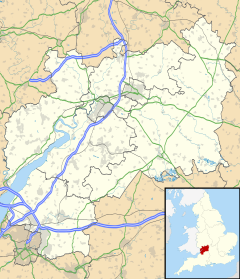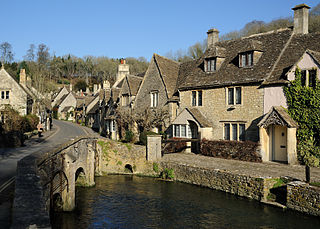
The Cotswolds is a region of central South West England, along a range of rolling hills that rise from the meadows of the upper River Thames to an escarpment above the Severn Valley and the Vale of Evesham. The area is defined by the bedrock of Jurassic limestone that creates a type of grassland habitat that is quarried for the golden-coloured Cotswold stone. It lies across the boundaries of several English counties: mainly Gloucestershire and Oxfordshire, and parts of Wiltshire, Somerset, Worcestershire, and Warwickshire. The highest point is Cleeve Hill at 1,083 ft (330 m), just east of Cheltenham. The predominantly rural landscape contains stone-built villages, towns, stately homes and gardens featuring the local stone.

Eric Arthur Blair was a British novelist, poet, essayist, journalist, and critic who wrote under the pen name of George Orwell, a name inspired by his favourite place, the River Orwell. His work is characterised by lucid prose, social criticism, opposition to all totalitarianism, and support of democratic socialism.
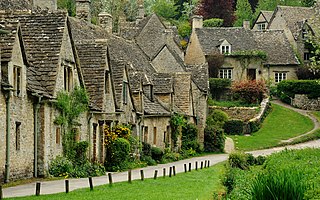
Gloucestershire is a ceremonial county in South West England. It is bordered by Herefordshire to the north-west, Worcestershire to the north, Warwickshire to the north-east, Oxfordshire to the east, Wiltshire to the south, Bristol and Somerset to the south-west, and the Welsh county of Monmouthshire to the west. The city of Gloucester is the largest settlement and the county town.

Dursley is a market town and civil parish in the Stroud District of Gloucestershire, England. It lies between the cities of Bristol and Gloucester. It is under the northeast flank of Stinchcombe Hill, and about 4 miles (6.4 km) southeast of the River Severn. The town is adjacent to the village of Cam. The population of Dursley was 7,463 at the 2021 Census.

Stroud is a market town and civil parish in Gloucestershire, England. It is the main town in Stroud District. The town's population was 13,500 in 2021.

Wotton-under-Edge is a market town and civil parish in the Stroud district of Gloucestershire, England. Near the southern fringe of the Cotswolds, the Cotswold Way long-distance footpath passes through the town.
Falfield is a village, located near the northern border of the South Gloucestershire district of Gloucestershire, England on the southern edge of the Berkeley Vale, to the east of the River Severn and just falling into the boundary of the Cotswolds. It is the last parish on the northern boundary of South Gloucestershire. The area has a Wotton-under-Edge (GL12) post code and so is often incorrectly listed as being in the Stroud district of Gloucestershire. Falfield is one of the longest villages in England, alongside local village Cromhall.
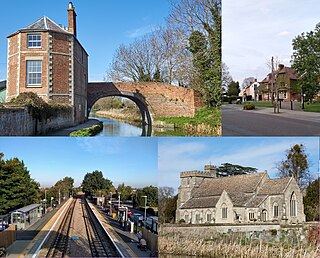
Stonehouse is a town in the Stroud District of Gloucestershire in southwestern England.
Brimscombe and Thrupp is a civil parish made up of the villages of Thrupp and Brimscombe, in the narrow Frome Valley slightly south-east of Stroud, Gloucestershire, England. The parish also includes the hamlets of Quarhouse and The Heavens. The population taken at the 2011 census was 1,830.

"In the Bleak Midwinter" is a poem by the English poet Christina Rossetti. It was published under the title "A Christmas Carol" in the January 1872 issue of Scribner's Monthly, and first collected in book form in Goblin Market, The Prince's Progress and Other Poems.
Rodborough is a large village and civil parish in the district of Stroud, Gloucestershire, in South West England. It is directly south of the town of Stroud, north of the town of Nailsworth and north-west of the town of Minchinhampton. The parish includes the settlements of Bagpath, Butterrow, Kingscourt, Lightpill and Rooksmoor, and is adjacent to the Stroud suburb of Dudbridge. The population taken at the 2011 census was 5,334.

Gladys' Leap is the fourteenth studio album by Fairport Convention, released in August 1985. It was recorded in April and May 1985 at Woodworm Studios, Barford St. Michael, Oxfordshire, UK. It was produced and engineered by Simon Nicol, Dave Mattacks and Dave Pegg and the assistant engineers were Tim Matyear and Mark Powell. The album features the first contributions to a Fairport album by founding member Richard Thompson since Rosie in 1973. Thompson wrote the opening track "How Many Times" and played lead guitar on "Head in a Sack".

Katha, sometimes also spelled Kathar, is a town in Sagaing Region, Myanmar, on the west side of the Irrawaddy River on a bluff with an average elevation of 124 m (407 ft). Most of the town is more than 10 m (33 ft) above the river. Katha is known for having inspired Kyauktada, the fictional setting of George Orwell's Burmese Days.

Emma Larkin is the pseudonym of an American journalist and author. Born in The Philippines to an American mother, her family moved to Thailand when she was one year old, where she lived for the next nine years. At least part of this time was spent in Bangkok, where she has lived as an adult since at least 2003. Larkin was educated in the UK from the age of ten, at least partly at boarding school, and in 1999 completed a Master's degree in Southeast Asian History from London University's School of Oriental and African Studies, where she also studied the Burmese language. Larkin has given conflicting accounts of her early years, and has told interviewers that she has lived in Thailand her whole life.
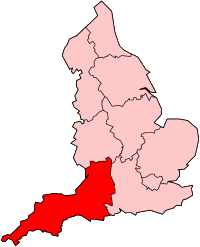
Scouting in South West England is about Scouting activities in the governmental region of South West England. The largest number of Scouts, volunteer leaders and groups are members of the Scout Association of the United Kingdom while there are some traditional Scouting groups such as the Baden-Powell Scouts' Association. The Scout Association administers the region through 7 Scout Counties, overseen by a regional commissioner, which follow the boundaries of the ceremonial counties they exist within. There are six active student associations at various universities in the region, each of which is affiliated to the Student Scout and Guide Organisation (SSAGO).

Standish is a small village and civil parish in the Stroud local government district in Gloucestershire, England.

Barnhill is a farmhouse in the north of the island of Jura in the Scottish Inner Hebrides overlooking the Sound of Jura. It stands on the site of a larger 15th-century settlement, Cnoc an t-Sabhail; the English name Barnhill has been in use since the early twentieth century. The house was rented by the essayist and novelist George Orwell, who lived there intermittently from 1946 until January 1949. He completed his final novel, Nineteen Eighty-Four, at Barnhill.

Cotswold Commons and Beechwoods is a 665.5-hectare (1,644-acre) biological Site of Special Scientific Interest in Gloucestershire, notified in 1954.
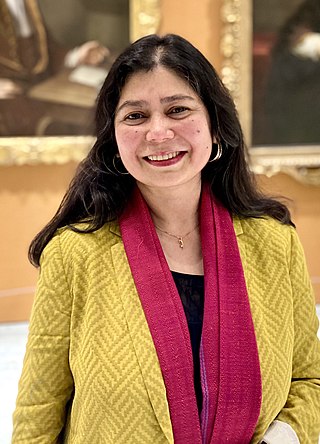
Shrabani Basu is an Indian journalist and historian, best known for writing Spy Princess (2006), an account of the life of Noor Inayat Khan, and Victoria & Abdul (2010), based on the friendship between Queen Victoria and Abdul Karim. She later compiled the stories of Indian men sent to Europe in the First World War, in For King and Another Country (2015). In The Mystery of the Parsee Lawyer (2021), she showed how Arthur Conan Doyle proved the innocence of George Edalji, an Indian lawyer in early twentieth century Midlands, England.

Painswick Stream is a small river in Gloucestershire, England. It is a tributary of the River Frome, and flows generally southwards, passing around the village of Painswick and through the town of Stroud. It used to join the Frome at its mouth, but was diverted into the then-derelict Stroudwater Navigation as part of a flood relief scheme in the 1950s. Despite its small size, it has been used to power a significant number of mills, many of which were associated with cloth manufacture until the industry was hit by a series of depressions in the 1820s and 1830s. Some found other uses, being used for grinding corn and for the manufacture of walking sticks and umbrella sticks, another prominent local industry. Many were subsequently demolished, but a number survive which have been granted listed building status.


